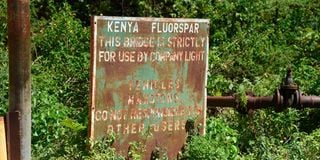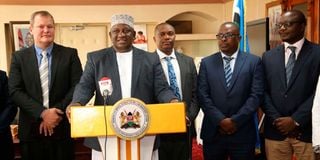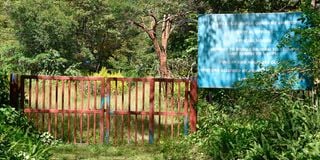Kenya inks Sh4.8bn deal to revive fluorspar mining in Kerio Valley

Rusting signposts at Fluorspar Mining Company in Elgeyo Marakwet County on September 28, 2021.Soy-Fujax Mining Company will pump in Sh4.8 billion to restart fluorspar mining activities.
What you need to know:
- The Kenya Fluorspar Company closed up shop more than 10 years ago due to a slump in global fluorspar prices.
- Soy-Fujax Mining Company will pump in Sh4.8 billion to restart fluorspar mining activities,
- The exit of the Kenya Fluorspar Company had left South Africa and Morocco as the only countries in Africa engaged in flourspar mining.
The national government has signed a multibillion-shilling deal with a UK-based firm to revive operations at the Kenya Fluorspar Company in Kerio Valley.
In the deal that was signed on Friday last week, Soy-Fujax Mining Company will pump in Sh4.8 billion to restart mining activities, more than 10 years after the Kenya Fluorspar Company closed up shop due to a slump in global fluorspar prices.
Mining, Blue Economy and Maritime Affairs Salim Mvurya Cabinet Secretary witnessed the signing of the agreement in which the central government will retain a 15 per cent stake in the company.

Mining, Blue Economy and Maritime Affairs Cabinet Secretary Salim Mvurya (second left) addresses journalists during a presser at his office in Nairobi on February 16, 2024.
“The ongoing reforms [in the Kenya Fluorspar Company] are geared towards making the sector attractive for investors,” Mr Mvurya said.
Soy-Fujax UK Director Hendrick Ryst and the firm’s boss for East Africa John Masada were both present during the signing of the contract.

The entrance to Fluorspar Mining Company in Elgeyo Marakwet County, on September 28, 2021. The factory collapsed in 2016.
About 3,000 workers lost their jobs when the company wound up operations. The exit of the Kenya Fluorspar Company left South Africa and Morocco as the only countries in Africa engaged in flourspar mining.
More than 500 families were displaced from 9,070 acres to pave way for mining activities.
The displaced families are demanding Sh3 million per acre following their displacement over 40 years ago.
“It is unfortunate that it has taken too long for the government to compensate the displaced families, who have been subjected to hardship following their eviction from their ancestral lands,” said Mr Micah Kigen, a local politician.
At the peak of the mining operations, Kenya used to produce 120,000 tonnes of fluorspar annually, compared to South Africa’s 300,000 tonnes and Morocco’s 100,000 tonnes.
The planned revival of the firm comes as good news for investors in transport sector, who said it will boost their businesses.
“Transporters who lost business following the collapse of the company will , now be able to return,” said Mr James Wendot, whose lorries used to truck the mineral to Flax trading centre. From there, it was loaded onto a train and transported to Mombasa to be shipped abroad.
Some of the markets that were affected by the closure of the company included Muskut, Kimwarer, Turesia, Kabokbok, and Kowochii.
“Only three out of 13 businesses survived when the company suspended its operations in 2010,” said Ms Leah Jepkurui, a hotelier in Kimwarer.

Fluorspar mining at the Kerio Valley. The story of fluorspar started in the late 1960s, when an independent local mineral prospector, M Al-Amin, discovered rich fluorspar deposits in the Kerio Valley.
Micro-finance institutions and eateries in Kimwarer, among other businesses whose major clientele were employees of the mining company, were forced to close down or relocate.
“We had no option but to relocate to other areas due to lack of business,” said Mr Joseph Kwambai, who operates an M-Pesa outlet in Muskut market.
Also affected were schools, health centres, athletics programmes and other community projects that were being supported by the company.
At the same time, there are fears that rampant banditry attacks in insecurity hit counties in the North Rift region are being fuelled by the fight for control of natural resources such as oil and precious minerals, rather than cattle raids or disputes over water and pasture.
Leaders from the region have called for dialogue to resolve the underlying factors that has led to the deaths of dozens of people, including security officers, and displaced hundreds of families.
“The scramble to control natural resources such as oil, geothermal wells and other minerals needs proper investigation and resolution that will lead to lasting peace it the region,” Mr Joel Kaino, a peace crusader in Endo, Marakwet East, told Nation.
For instance, he said, the government needs to hasten the process of resolving the contentious location of Kapedo on the border of Turkana and Baringo counties.
“There is lack of clarity on the boundary between the two counties. We need to determine once and for all whether Kapedo is in Turkana or Baringo,” Mr Jackson Chetotum, a resident of Tiaty in Baringo County, said.
The area is rich mineral deposits discovered at Silale Hills, which has fuelled armed conflict between the Turkana and Pokot communities.





